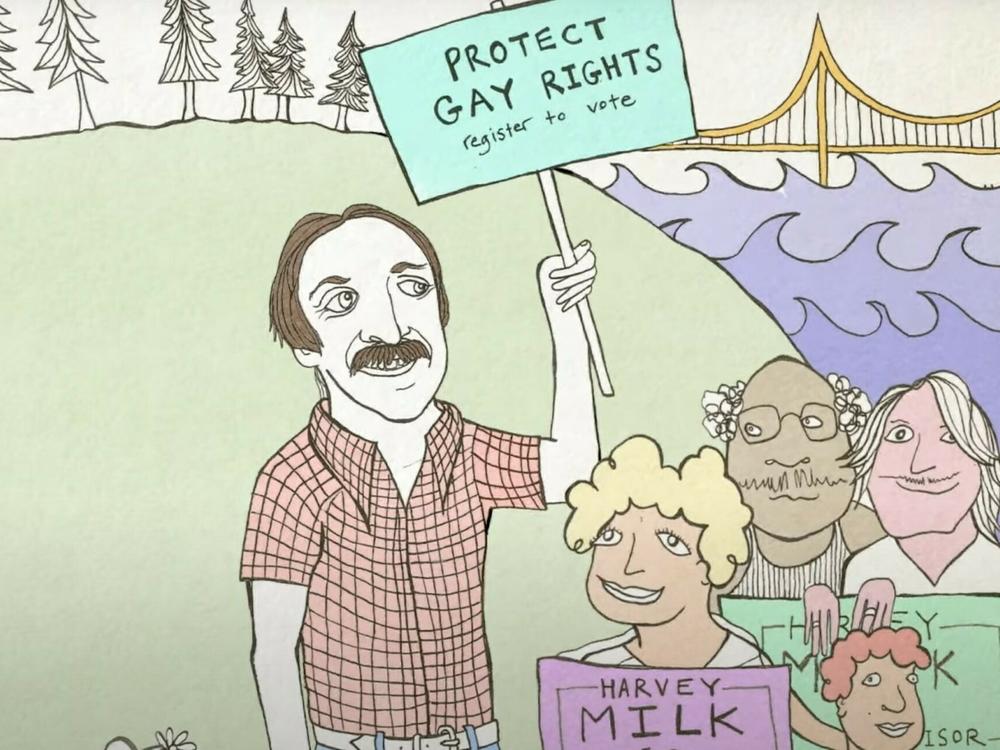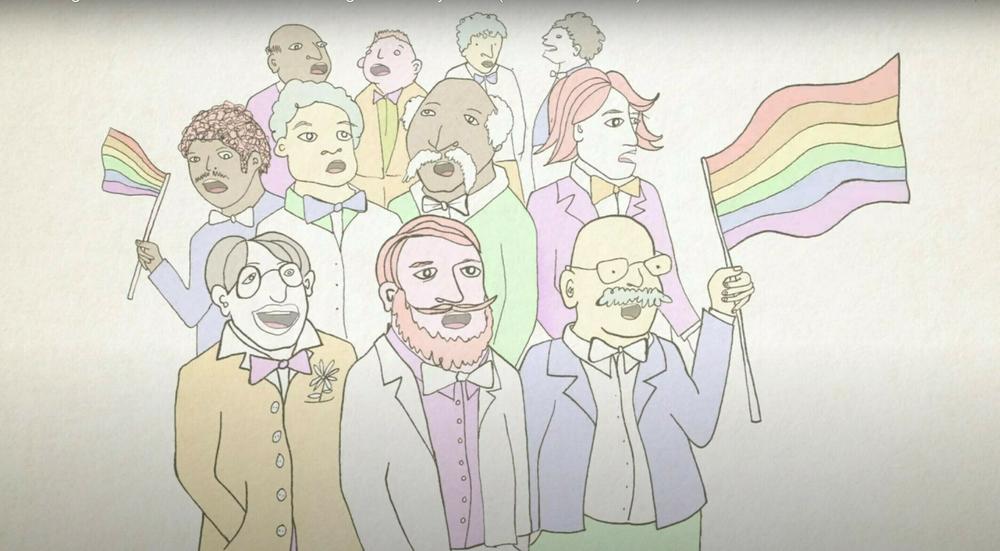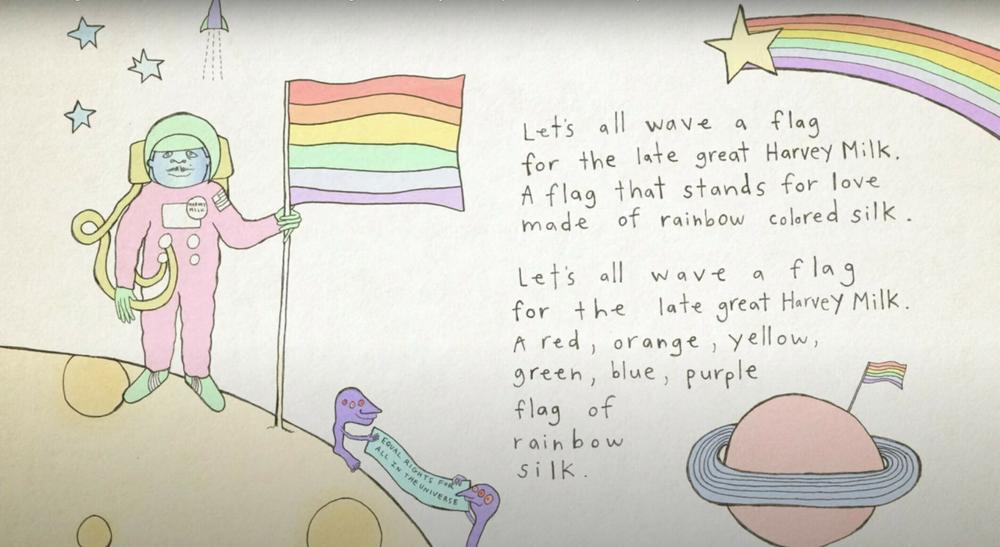Section Branding
Header Content
An ode to Harvey Milk for Smithsonian Folkways' 75th birthday
Primary Content
San Francisco-based preschool teacher Greg Gardner says he and his friend, singer-songwriter Cass McCombs, "have collected way too many Folkways records" over the years — by Woody Guthrie, Michael Hurley, Lead Belly, Mary Lou Williams, Ella Jenkins and others.
The pair are huge fans of the influential label founded in 1948 by Moses Asch. So they were thrilled when Folkways agreed to include their new album of children's songs to the label's 75th anniversary celebration.
A storied collection turns 75
To say Moses Asch's interests were eclectic would be an understatement. With Folkways, he set out to, quite literally, capture the world's sounds, from Cajun accordion to Langston Hughes' voice, Irish ballads to the sound of steam locomotives.
His catalogue of more than 2,000 recordings was a fitting sonic addition to the so-called "nation's attic." It was also in line with the Smithsonian's mission statement - "The increase and diffusion of knowledge" – says Folkways spokesperson Jonathan Williger
"Knowledge is not just words on a page. Sound is a major way that humans interact with the world," says Williger, "The Folkways catalog is full of both the monumental and the minute, everything from the sound of a stapler being stapled to the March on Washington."
"[Folkways] records talk of serious subjects, but they do so in a really fun way, that's silly at times and heartfelt, and I really connect to that," says Gardner, "They sound quite simple and they're also pretty stripped down. I've always loved...the realness of that."
Crafting a new addition, keeping the old vibe
Gardner and McCombs tried to approach their new album in a way that would fit the Folkways' vibe. Mr. Greg & Cass McCombs Sing and Play New Folk Songs for Children ranges from silly to serious with songs about a worm named Wilma, flying a paper airplane, recycling and Ruth Bader Ginsburg.
The lead single is "Wave a Flag For Harvey Milk," a simple ode to the renowned gay activist and politician. The song was released in June, during Pride Month, in advance of the full album's August release.
McCombs and Gardner's effort is a continuation of Folkways' long history of releasing children's albums such as Woody Guthrie's Songs To Grow On and numerous recordings by the First Lady of Children's Music, Ella Jenkins.
Folk songs for children are, "easy to play and can be passed down from person to person," says Williger. As a subject for a song, Harvey Milk fits Folkways' "long history of social justice music." Plus, it's "about the social issues of your place," notes Williger.
Gardner teaches at a school five blocks from San Francisco's Castro District where Milk lived, worked and campaigned. He says the song began as "a sing along coloring book" he created for his preschool students. "I thought they might engage with the coloring book more than they would with me just talking about Harvey Milk," he explains.
Harvey Milk "stood up for his people down by the Golden Gate"
In 1977, Milk became one of the first openly gay public officials in the U.S. when he was elected to the San Francisco Board of Supervisors. At the time, people could be fired from their jobs for being gay.
Milk, along with other activists, campaigned to defeat a ballot proposition that would have banned gay people from working in California schools. On November 7th, 1978, the proposition was defeated by more than a million votes.
Three weeks later, Milk and San Francisco Mayor George Moscone were assassinated by a former city supervisor.
"Harvey Milk's message of advocating for others and treating people fairly and being proud to be your true self is in line with the values that we hope to instill in the preschool classroom," says Gardner.
Kids like rainbows
Students, parents and other community members sing "Wave a Flag" at the annual Harvey Milk Celebration at Children's Day School where Gardner's been teaching for 12 years.
To help preschoolers understand Milk's legacy of human rights, Gardner tries to make parallels with their own lives.
"Kids will have different interests and then others will question their interests. And then the original kid will, you know, get down and say, 'Well, this person said that I can't be Elsa, too, because they're already Elsa.' And, 'I'm a boy and I can't be Elsa.'" Gardner says he tells them, "'Everybody has their own interests and everybody can be who they want to be, and it's just up to you.' And then they kind of get that and it clicks."
There's another reason Harvey Milk's legacy "clicks" with kids: rainbows.
"All kids like rainbows, seems," Gardner has learned. When he talks to his students about Milk, they also learn about Gilbert Baker, the San Francisco flag-maker who came up with what has become the international symbol for the LGBTQ movement. As the song says, "A flag that stands for love made of rainbow colored silk."
This story was edited by Rose Friedman.
Copyright 2023 NPR. To see more, visit https://www.npr.org.



